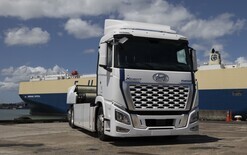Consultation snub over clean cars

The Motor Industry Association (MIA) is calling on the Ministry of Transport (MoT) to rethink its approach after learning the government will not be consulting on its draft regulations for the clean car discount.
David Crawford, MIA’s chief executive, has released correspondence with MoT officials about the programme that aims increase the number of lower-emissions cars in New Zealand's fleet.
He says: “They have decided to not consult on the regulations for the clean car discount. They will on the rule and may – note have not said will – on regulations for the clean car standard, but not the discount. This is disappointing to say the least.”
The clean car discount was introduced in July and offers rebates for battery electric vehicles (BEVs) and plug-in hybrids (PHEVs) when they are first registered by consumers in New Zealand.
It is due to expand to a full feebate scheme from April 2022 with penalties and discounts based on a vehicle’s emissions.
The clean car standard is due to be introduced later in 2022 and will require importers to lower the carbon dioxide (CO2) emissions of the vehicles they bring into the country or risk paying penalties.
The Land Transport (Clean Vehicles) Amendment Bill passed its first reading in September and is open for consultation until 11.59pm on November 4.
Crawford, pictured, sent emails to the MoT on October 12 and 14 seeking feedback on several issues. He received a reply from Arif Hasan, an MoT adviser, on October 29.
In the reply, Hasan says: “Most of the substantive decisions on the content of the draft Land Transport (Clean Vehicle Discount Scheme) Charges Regulations have already been made by cabinet.
“These decisions are contained in cabinet papers and minutes in the public domain.
“Te Manatu Waka the Ministry of Transport will therefore not be consulting on the draft Land Transport (Clean Vehicle Discount Scheme) Charges Regulations.
“There may be targeted consultation with industry on the Clean Vehicle Standard Regulations later in 2022 as they are developed.”
He adds there will be “targeted consultation with the industry on the fuel consumption and emissions data rule in November or December 2021”, which is expected to last two to three weeks.
Crawford says the answers he received from the MoT raise concerns, especially the lack of consultation over the feebate regulations, and he responded to the ministry on November 1.
“This is very disappointing as it gives industry no chance to review the workability of the regulations,” his email says.
“Operationalisation of the policy through regulations is the critical part of the policy.
“Not consulting on the draft regulations is unfair, while you might believe these will be drafted correctly, we do not agree.
“We ask that you reconsider this.”
Classification confusion
The MIA had also queried with the MoT the classification by the government for class MC vehicles, which are off-road passenger vehicles.
Hasan’s email says MC vehicles have always been a part of the Type A vehicle category, with a cabinet decision considering light commercial vehicles (LCVs) as utility type vehicles in the NA, MD1, MD2 and MB classes.
“The definition of the MC vehicle class in the Land Transport Rule: Vehicle Standards Compliance 2002 is consistent with the definition of the ‘Type A’ vehicle in the Clean Vehicles Amendment Bill, noting that the MC vehicle class falls within the Type A vehicle category,” adds Hasan.
Crawford disputes this and in his reply email to Hasan says such a statement “is simply not true”.
He points to an MoT document sent to the MIA in February 2021, which is based upon cabinet decisions from the previous month, that states MC vehicles are part of the LCV grouping.
“This [February] advice was expected as it was what the ministry reported to industry during the workshops which the previous minister, Julie Anne Genter, had held with us,” Crawford says in his email.
“On the basis of this advice, members started to negotiate with their head offices to see if they could begin to revise their production for LPV [light-passenger vehicle] and LCV vehicles in light of the cabinet decisions.
“It came as some surprise when the Bill was introduced to see this had changed. All their work was for nought.”
Hasan says in his email that the Clean Vehicles Amendment Bill is subject to consultation and encourages Crawford to raise any concerns in a submission “so officials can take your comments into consideration before finalising the bill”.





